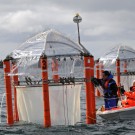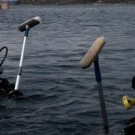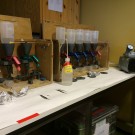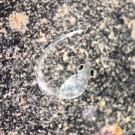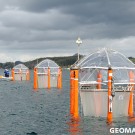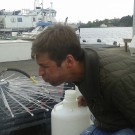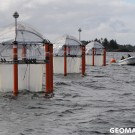21 July 2015 / Bergen, Kiel. In a two-months long experiment in Norway, scientists from GEOMAR Helmholtz Centre for Ocean Research Kiel investigated how ocean acidification affects the plankton community and material fluxes within the marine food web. Their observations confirm that positive and negative effects have to be expected. Among the losers are the […]
KOSMOS cleaning
Cleaning work of equipment could be one of the most important processes in lab study. Sometimes, it could even occupy 30% of your time in the lab. However, how does it look like in a field study? The KOSMOS cleaning could be divided into two parts: inside and outside. (KOSMOS: Details could be found on […]
An endless journey, but two amazing weeks
Some choose the plane, but we decided to drive the car to join the KOSMOS family in Espegrend marinbiologisk stasjon off Bergen. Why? Our first motivation to drive was for taking along all the equipment for our study (microscopes, respiration system and small materials…), but did you know that our personal carbon emissions also were […]
New Blood arrived!!!
It’s been almost a week that we couldn’t share anything, but we had very science related(!) reasons: There was a shift change of Master’s students on Tuesday in KOSMOS Town. We (Rafael, Shawn, Dorthe, Serra) were warmly welcomed to this big KOSMOS Family! Luckily for us, end of the same week was the middle of […]
Our Ocean Instruments
What are the instruments scientists used for? It may be mysterious to most of people. Today, let’s get a short impression by going close into a field study of ocean acidification. KOSMOS It is a close system. KOSMOS is like a floating iceberg. Don’t be misled by its part above water. In fact, the […]
The core parameters – Filtration as a mission!
We (the girls from the filtration lab) are one team of several here at Espeland Marine Station near Bergen. We produce data that are the baseline for many other experiments conducted in this facility – oh dear! But what is filtration all about? Just imagine: we basically do the same everyone does in the morning […]
Are herring kids afraid in the dark?
Looking in the egg-incubators since the day we put them into the mesocosms, you could see pairs of eyes staring back at you. Then suddenly it got less and less, fortunately not unexpected, since they were hatching just as calculated by the temperature they experienced over time. Signs for first hatching could already be seen […]
KOSMOS 2015 presentation at IMR
What’s going on at the Espeland Marine Biological Station? What are these orange constructions in the Raunefjord for? And why do we have to care about ocean acidification? In his Hjort Guest Lecture, Prof. Ulf Riebesell from GEOMAR gives a brief overview of the present state of knowledge about ocean acidification, highlights some deficits in […]
It’s all a matter of taste
Our station is full of high-tech equipment. And all of the machines have really fancy names. Just to mention some of them: There are the Accuri and Cytosense, two flow cytometers to count the smallest organisms in the ocean. Just next door you can find the QuAAtro, an autoanalyzer for nutrients, or the Airica, which […]
No matter the weather
A fresh northwesterly breeze blew away the rainclouds this morning and made today’s sampling a bit challenging. But everyone returned cheerfully and hungry enough for an early lunch…
